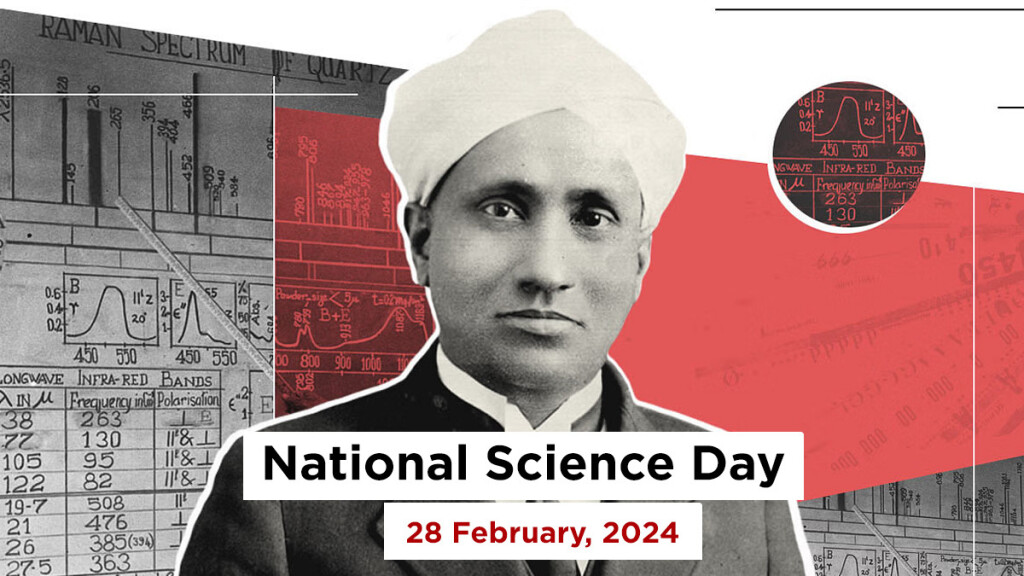On February 28, National Science Day, India honours the scientific community's efforts and celebrates the discovery of the Raman Effect. The country is ready to commemorate National Science Day 2024 on February 28, 2024, with the theme "Indigenous Technologies for Viksit Bharat." This NEXT IAS article provides a thorough history, significance, and other details of National Science Day, as India celebrates the accomplishments of our scientific community on this unique day.
Table of contents [Show]
National Science Day (NSD)
Each year on February 28, India celebrates National Science Day in honor of scientist Sir Chandrasekhara Venkata Raman, sometimes known as C.V. Raman, who discovered the "Raman Effect." The event provides a forum for recognizing and educating the public about the contributions made by the scientific community to the advancement of our country.
History of National Science Day (NSD) in India
In India, National Science Day has a history that begins in the late 1920s. The timeline of its inception and development in India is elucidated below.
1928: The Raman Effect Was Discovered
- Sir C. V. Raman, an Indian scientist, made the astounding discovery of the dispersion of light in inelastic collisions with matter molecules on February 28, 2008.
- The "Raman Effect" is the term given to this finding in honor of its discoverer.
Sir C.V. Raman received the Nobel Prize in 1930.
- The discovery of the Raman Effect fundamentally changed our knowledge of how light and matter interact and had a profound effect on many scientific fields. In 1930, Sir C.V. Raman received the Nobel Prize in Physics in recognition of his contributions.
- It was a historic moment for Indian research when an Indian scientist became the first Asian to win the Nobel Prize in any field of study. It not only established India's scientific dominance but also put the country on the scientific map of the world.
1986: The NCSTC's proposal
- The Raman Effect's discovery date, February 28, was suggested to be declared National Science Day by the National Council for Science and Technology Communication (NCSTC) in 1986.
- The proposal from NCSTC was intended to commemorate the groundbreaking discovery of the Raman Effect and to promote scientific inquiry and understanding among Indians.
- The proposal from NCSTS was approved by the government in 1986, and on February 28th, India officially celebrated National Science Day.
First National Science Day, 1987
- On February 28, 1987, National Science Day was formally observed for the first time in India. Since then, it has grown to be a significant occasion in India's academic and scientific communities, encouraging science and a scientific mindset among the general public.
Theme for National Science Day 2024
Every year, a theme that emphasizes a significant facet of Indian science and its social ramifications is announced by the Department of Science and Technology in honor of National Science Day. These themes demonstrate how science may be applied in a variety of ways to address modern issues.
The topic "Indigenous Technologies for Viksit Bharat" has been selected for the 2024 National Science Day celebrations. The following illustrates this theme's diverse significance:
- demonstrates a deliberate effort to raise public knowledge of and enthusiasm for the indigenization of innovation, science, and technology
- acknowledges and encourages the achievements of the Indian scientific community in using indigenous technology to solve issues facing the country's development.
- heralds the beginning of a new age in which the scientific community and the general public will have the chance to cooperate and work together to improve both India and humankind's overall well-being.
- highlights the role of science in transforming India into Atmanirbhar.
- confirms Amrit Kaal's vision of “Viksit Bharat @2047.”
Significance of National Science Day Celebrations
The National Day of Science is celebrated annually and is extremely significant in a world where science and technology are transforming civilizations due to a number of factors, some of which are stated below.
- Encourages our Scientists: Honoring the whole scientific community of our country is equivalent to holding a nationwide celebration commemorating the discovery of the Raman Effect. They are inspired to pursue their scientific aspirations by this.
- Increases Public Understanding of Science: As part of the National Day of Science celebrations, outreach programs are held to help increase public knowledge of a variety of scientific concepts and recent scientific breakthroughs.
- Encourages Scientific Temper: On this day, a variety of talks, discussions, tests, and exhibitions are held to inform people about the most recent scientific discoveries and to instill scientific temper and logical thinking in them. As a result, it facilitates the execution of a Fundamental Duty guaranteed under Article 51A of the Indian Constitution.
- Young Minds Are Sparkled with Curiosity by Exciting Activities: Children are passionately introduced to science through enjoyable and interactive experiences such as science fairs, workshops, and exhibitions.
- Highlights Developments in Indian Science: National Science Day is an opportunity to highlight the most recent successes and initiatives in a range of scientific domains throughout India. This encourages pride in the country and motivates the next generation to work in science.
- Promotes International Collaboration: India shows its dedication to scientific advancement and creates opportunities for cooperation with global scientific communities by honoring science on a national level.
- Strengthens Scientific Foundation: It fortifies our country's scientific foundation by motivating the next generation to advance science and use it to solve global issues.
The significance of National Science Day celebrations extends beyond merely honoring the groundbreaking scientific discovery of the Raman Effect. It also serves as a window into India's continuous ascent to prominence in the world of science. It significantly influences India's scientific advancement by respecting the past, appreciating the present, and looking to the future. On this day, the country's shared ambition to explore and invent for a better future—one in which science and technology are used to build a more just, sustainable, and prosperous world for all—is reaffirmed.









